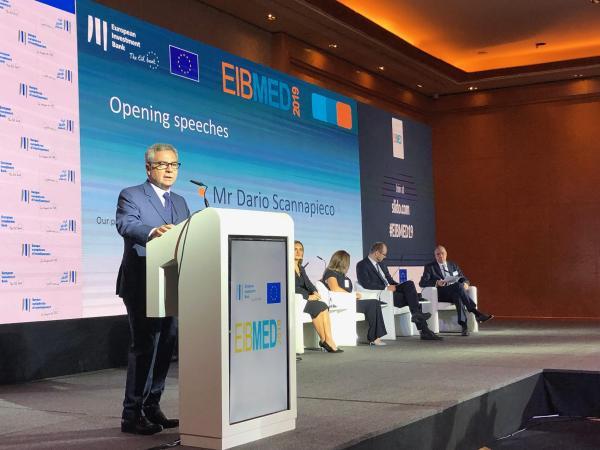
The European Investment Bank (EIB) provided EUR 5.6 billion of financing during 2015-2018 supporting the economies of the EU Mediterranean Partner countries (Egypt, Jordan, Lebanon, Morocco, Palestine and Tunisia). Over these last 4 years, EIB financing has contributed to improve water and sanitation services for 5.8 million people, bring reliable and environment-friendly transport to 1.4 million people, and upgrade 1170 km of roads, while sustaining more than 300,000 jobs in the private sector.
Today, the Bank of the European Union reiterated its commitment to step up and further diversify its investments in the EU Mediterranean Partner Countries, during the 19th edition of the EIB-Med conference “Investing in a resilient and inclusive future” held in Beirut in partnership with the European Union Delegation to Lebanon and Lebanese Council for Development and Reconstruction.
The EIB-Med conference was inaugurated by the Minister of State for Investment and Technology Adel Afiouni, the Egyptian Minister of Investment and International Cooperation Dr. Sahar Nasr, Vice President of the EIB Dario Scannapieco, Polish Deputy minister of foreign affairs Marcin Przydacz and the newly appointed, EU ambassador to Lebanon Ralph Tarraf.
Promoting economic growth and boosting job opportunities for all are cornerstones of the Partnership Priorities agreed between the EU and the different countries in the Mediterranean and the EIB is using all tools at its disposal to increase its investments in the region in support of these priorities. Through its Economic Resilience Initiative (ERI), and with support from the European Commission and EU member states, the EIB has scaled up its financing activities in the EU neighbourhood (Mediterranean Partners and West Balkans) considerably. Since its launch in 2016, additional financing agreements were signed for 38 projects with total value of EUR 3.5 billion in the Mediterranean Partner Countries and Western Balkans. These financing agreements include projects in Egypt, Jordan, Lebanon, Palestine, Morocco and Tunisia and cover investments in education, industry, water and sewerage, solid waste, energy, transport and SMEs sectors.
“The region faces economic challenges however it has many opportunities for a dynamic and strong economies in the future. To face those challenges and reap the benefits of the opportunities, the EIB set up the Economic Resilience Initiative. The initiative has aimed to provide additional finance and advisory services. And it has delivered, a total of 2.9 billion financing were signed with governments and private sector actors in Egypt, Jordan, Lebanon, Morocco, Palestine and Tunisia. This additional finance brought total EIB financing to reach 5.6 billion over three years. The impact of projects financed is what matters for us. More people will have better access to electricity and water and sanitation services, enjoying reliable and fast transportation and new jobs. The success of ERI has been the result of working together with our partners and the strong support we received from the European Commission and EU member states”, said Dario Scannapieco, Vice president of the EIB.
Ambassador of the European Union to Lebanon Ralph Tarraf said: “CEDRE is about funding plus projects plus reforms. It cannot be untangled, it cannot work without the public nor without the private sector. Firm dedication to CEDRE commitments is in Lebanon's interest, and the EU remains fully supportive. Together with our Member States and the EIB, 40% of the CEDRE pledges come from the European Union. The success and the stability of Lebanon and the region are of strategic importance to Europe. The challenges are shared challenges, whether security, economy, migration, and the environment. We are partners with our neighbouring countries. We are not here to impose solutions. We are here to share best practices, offer advice and support. I am looking forward to working with all of you in this spirit in the next couple of years.”
Thanks to EUR 130 million donor funds raised from EU Member States, including Croatia, Italy, Lithuania, Luxembourg, Poland, Slovakia, Slovenia and the UK.
In addition, EUR 90m for technical assistance and advisory services has been agreed as part of EIB’s own contribution.
Background information:
Speech of Vice-President Dario Scannapieco
The EIB’s Economic Resilience Initiative (ERI), approved by the EU Member States in 2016, consists of an integrated package of loans, concessional finance and innovative instruments designed to enable financing of an additional EUR 15 billion of investments on top of schemes already planned.

Photographer: Khaled Elnimr ©EIB
Download original

Photographer: Khaled Elnimr ©EIB
Download original

Photographer: Khaled Elnimr ©EIB
Download original

©EIB
Download original